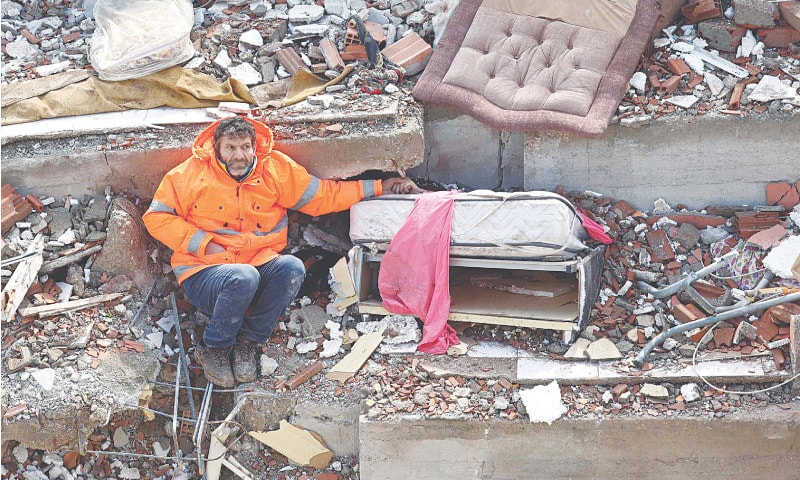• Erdogan declares three-month emergency
• Massive fire erupts at Iskenderun Port
SANLIURFA: Rescuers in Turkiye and Syria battled bitter cold on Tuesday in a race against time to find survivors under buildings flattened by an earthquake that killed more than 7,300 people.
Tremors that inflicted more suffering on a border area, already plagued by conflict, left people on the streets burning debris to try to stay warm as international aid began to arrive.
But some extraordinary survival tales have emerged, including a newborn baby pulled alive from rubble in Syria, still tied by her umbilical cord to her mother who died in Monday’s quake.
“We heard a voice while we were digging,” Khalil al-Suwadi, a relative, said. “We cleared the dust and found the baby with the umbilical cord (intact) so we cut it and my cousin took her to hospital.” The infant is the sole survivor of her immediate family, the rest of whom were killed in the rebel-held town of Jindayris.
The 7.8-magnitude quake struck on Monday as people slept, flattening thousands of structures, trapping an unknown number of people and potentially impacting millions.
Whole rows of buildings collapsed, leaving some of the heaviest devastation near the quake’s epicentre between Gaziantep and Kahramanmaras.
The destruction led to Turkish President Recep Tayyip Erdogan declaring on Tuesday a three-month state of emergency in 10 southeastern provinces.
‘Children are freezing’
Dozens of nations, including the United States, China and the Gulf States, have pledged to help, and search teams as well as relief supplies have begun to arrive by air. Yet people in some of the hardest-hit areas said they felt they had been left to fend for themselves.
“I can’t get my brother back from the ruins. I can’t get my nephew back.
Look around here. There is no state official here, for God’s sake,” said Ali Sagiroglu in the Turkish city of Kahramanmaras.
“For two days we haven’t seen the state around here... Children are freezing from the cold,” he added.
A winter storm has compounded the misery by rendering many roads — some of them damaged by the quake — almost impassable, resulting in traffic jams that stretch for kilometres in some regions.
The cold rain and snow are a risk both for people forced from their homes — who took refuge in mosques, schools or even bus shelters — and survivors buried under debris.
“It is now a race against time,” said World Health Organisation chief Tedros Adhanom Ghebreyesus. “We have activated the WHO network of emergency medical teams to provide essential health care for the injured and most vulnerable,” he added.
The latest toll showed 5,434 people killed in Turkiye and at least 1,872 in Syria, for a combined total of 7,306 fatalities. There are fears that the toll will rise inexorably, with WHO officials estimating up to 20,000 may have died.
A fire that engulfed hundreds of shipping containers at Turkiye’s Iskenderun Port has now been extinguished, the defence ministry said on Tuesday, but it was not clear when operations would resume at the port. Drone footage showed fierce flames blackening hundreds of containers on the dock, with water jets from a fire truck dwarfed by the scale of the blaze.
Published in Dawn, February 8th, 2023

















































Dear visitor, the comments section is undergoing an overhaul and will return soon.